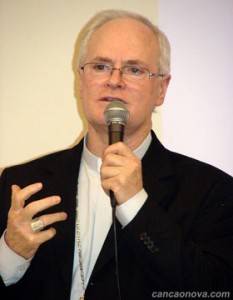by Cardinal Odilio Scherer
 Almost at the end of the Year of the Faith, the celebration of the Liturgical Solemnity of All the Saints, gives us the occasion to remember one of two final articles of the Profession of Faith: “I believe in the communion of the saints.” The Catechism of the Catholic Church explains well this affirmation of our faith in paragraphs 946 to 947.
Almost at the end of the Year of the Faith, the celebration of the Liturgical Solemnity of All the Saints, gives us the occasion to remember one of two final articles of the Profession of Faith: “I believe in the communion of the saints.” The Catechism of the Catholic Church explains well this affirmation of our faith in paragraphs 946 to 947.
The church possesses a “common patrimony”, of which all we are participate: holiness, gift of the Holy Spirit given to the disciples of Christ. We all contribute to this patrimony with our holy life and we all benefit from it. In the Church, no one is a solitary hero: we are in good company!
This brings us to have a special attention to the saints, that are the sublime testimonies of Christ; the Church upon proclaiming a saint, confirms that her life was an exemplary interpretation of the life of Christ and a luminous testimony of the Gospel of the Reign of God in the world. And as the gifts of God are innumerable, there are also numerous forms of holiness and of holy lives. Each saint in his/her way is an example of life according to the Gospel and can be imitated by others without fear of error.
The Catholic saints are not myths created by human fantasy, they are persons that lived in a time and in a space, they had a personal history, which can be known and verified; they are the members of the Church that already arrived there, where all of us what to be some day. But through the “Communion of the Saints”, they continue to be tied to us and us to them. They are masters of Christian life, witnesses and examples of perseverance in the faith, many times lives in the midst of innumerable difficulties.
I think, therefore, that the life of the saints is an important part of the Catechesis and of the initiation to Christian life. They already traveled the road that we are called to travel; they were exemplary disciples of Christ, they were good Christians and lived the virtues in an exemplary way, that also we are called to live.
I like to resume the Apostolic Letter of the New Millenium (at the beginning of the new millenium, 2001) of Pope John Paul II. It is brief, llluminated, programmatic. There it is said that holiness is the priority of the pastoral priorities. I don’t hesitate in saying that the horizon to which all must tend the pastoral road is holiness (cf. n. 30)
Holiness is the universal vocation of the baptized, conforms, the Council teaches us, to the speaking of the Church. (cf. Lumen Genitum chap. V.) Holiness is not an optional illustration to Christian life, but its very goal, through faith and through Baptism, we are in communion with that which is holy and the fount of all holiness. Holiness is one of the qualities of the Church and should also be marked by all its members: “This is the will fo God, your respect: your santification.” (1Thess 4:3). It is the vocation of all the baptized.
The pastoral programation should be marked by the search for holiness. Therefore, says still John Paul II in the same Apostolic Letter: “Asking a catechumen – do you want Baptism? – means at the same time do you want to be holy? (n.32) Holiness therefore, is not only for a few, but for all the disciples of Christ.
And Pope Francis, in the homily on the Solemnity of All Saints, returned to remember that the holiness has a road, a face and a name: Jesus Christ. To be in communion with Him, to follow his steps to imitate his example – this is the way of holiness.
Cardinal Odilio Scherer is the Archbishop of Sao Paulo, Brazil.
translated from Portuguese

